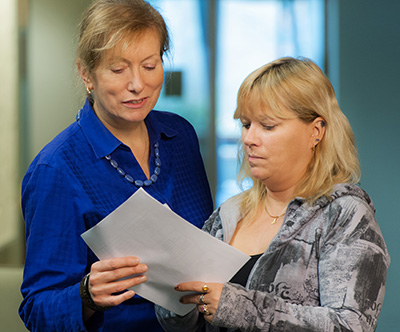
Ruth Martin (left) and former inmate Mo Korchinski are co-editors on the new book, Arresting Hope. Photo: Martin Dee.
Ruth Elwood Martin, a former prison physician and Clinical Professor in the School of Population and Public Health, is the co-editor of a new collection that strives to convey hope for women serving time in prison.
Arresting Hope, published last month by Inanna Publications, is a collection of poetry, stories, letters, interviews, fragments of conversations, reflections, memories, quotations, journal entries, creative nonfiction, and scholarly research.
The book tells the story of one provincial prison in Canada where creative leadership fostered opportunities for transformation, and where research and writing contributed to healing. It focuses on five women—a prison doctor (Dr. Martin), a prison warden, a prison recreation therapist, a prison educator, and a prison inmate — and their stories of grief, desire, and hope.
Dr. Martin, who worked part-time as a physician for 16 years in B.C. Corrrectional Centre medical clinics, is the Director of UBC’s Collaborating Centre for Prison Health and Education (CCPHE).
Dr. Martin’s collaborators on the book were Mo Korchiniski, a former inmate who recently completed a bachelor’s degree in social work and works as a research assistant with the CCPHE peer health mentoring program; Carl Leggo, a poet and Professor in UBC’s Department of Language and Literacy Education; and Lynn Fels, an Associate Professor in Arts Education at Simon Fraser University.
 At the CCPHE, Dr. Martin and Korchinski have recruited formerly incarcerated women to be peer health mentors for women coming out of provincial correctional centres and have carefully vetted resources to address their most urgent health and social needs during the first 72 hours after release — a critical period of time where women are most at risk of returning to their previous life.
At the CCPHE, Dr. Martin and Korchinski have recruited formerly incarcerated women to be peer health mentors for women coming out of provincial correctional centres and have carefully vetted resources to address their most urgent health and social needs during the first 72 hours after release — a critical period of time where women are most at risk of returning to their previous life.
The book includes some of Dr. Martin’s journal entries from her time as a prison physician, and her exploration of, ‘What is health?’ for incarcerated women; descriptions of how babies can live in prison; an explanation of the role of a prison recreation therapist; a discussion of the significance of indigenous education in Canadian prisons; and narratives of some incarcerated women, including Korchinski, and the transformations that they have undergone.
Arresting Hope conveys that prisons are not only places of punishment, marginalization, and trauma, but also places where people with difficult experiences can begin to compose stories full of healing, anticipation, communication, education, connection, and community.
Net proceeds from sales of Arresting Hope will support educational bursaries for women with incarceration experience and their children, and peer health mentoring for women as they transition out of custody.
Book Signing
A book signing for Arresting Hope will be held December 4th from 4:00 to 6:00 pm in the lobby of the School of Population and Public Health building, UBC. The event will include selected readings, remarks by some of the people featured in the book, and book signings. Anyone interested in attending the event should RSVP to arrestinghope.ccphe@gmail.com.